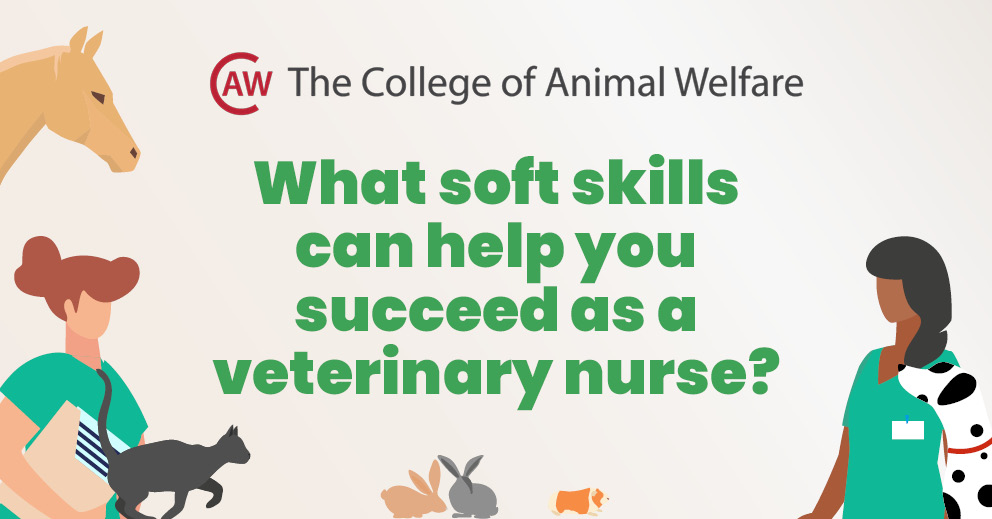
Working as a veterinary nurse is both demanding and rewarding, requiring a unique combination of technical ability and soft skills to provide the best care for animals and support for their owners.
Whether you’re looking to train as a veterinary nurse in the future, or currently working as an RVN, take a look at the core skills that can support your success in the veterinary nursing profession:
1. Communication
Effective communication is crucial for those who wish to succeed in veterinary nursing. Good communication as a veterinary nurse involves clearly and compassionately conveying information to pet owners and efficiently collaborating with colleagues. Veterinary nurses must be able to discuss treatment plans, provide updates, and educate pet owners about the health of their pet in a way that is easy to understand and sensitive to their concerns.
2. Empathy
Empathy is an important soft skill for veterinary nurses, as showing a sense of emotional insight is key to forming trust with pets and their owners, as well as fostering a positive clinical environment. For example, displaying empathy can help in soothing anxious pets and providing comfort to worried pet owners, enabling you to provide better nursing care.
3. Patience
Whether it’s a scared kitten hiding in the corner, or an owner asking lots of questions, dealing with pets and their owners often requires a high level of patience. Animals may be uncooperative or fearful, and treatments may not yield immediate results. Additionally, owners might become stressed or upset and need more time to understand their options or make decisions about their pet’s care. Sometimes your working day won’t run smoothly, but being able to stay calm and collected will make these moments much easier to handle.
4. Attention to detail
As a veterinary nurse you will be involved in a range of precise technical tasks, from administering medications to monitoring anaesthesia. Attention to detail is crucial, as it ensures that treatments are carried out correctly and safely, which is fundamental to the wellbeing of the animals under your care.
5. Adaptability
No two days are the same in a veterinary practice, and as a veterinary nurse you should be prepared for this. Veterinary nurses must be flexible and able to adapt to the unexpected, whether it’s an emergency surgery or a sudden change in a patients’ condition. Being able to think on your feet and adjust to new situations quickly is a valuable skill in this field.
6. Problem-solving
Critical thinking and problem-solving skills are vital for veterinary nurses, who often need to make quick decisions about patient care. This might involve figuring out why an animal is showing certain symptoms or deciding the best approach to a complex medical procedure. Effective problem-solving helps ensure high-quality and timely care for the patients.
7. Teamwork
Veterinary nursing is far from a solitary role, and successful nursing care is often a team effort. You will work closely with veterinary surgeons, other nurses, and support staff such as veterinary care assistants and veterinary receptionists. A good team player can work collaboratively, share responsibilities, support their colleagues and step up to lead where needed, all to enhance the overall functioning of the veterinary practice.
8. Resilience
Working as a veterinary nurse can be emotionally demanding. Dealing with sick and sometimes dying animals, along with distressed owners, requires a strong level of resilience. Being able to cope with emotional stress and bounce back from difficult situations is crucial for long-term success in the profession.
9. Organisational skills
Efficient organisational skills are paramount in veterinary nursing, in order to effectively care for all your patients, as well as complete additional administrative tasks. Being organised not only increases efficiency but also minimises the chances of errors, which can be critical in a fast-paced veterinary environment.
10. Professionalism
Maintaining a high degree of professionalism is essential in any veterinary role, including veterinary nursing. This includes adhering to ethical standards, respecting confidentiality, and presenting a courteous and respectful manner to both colleagues and clients. Professionalism fosters a positive workplace and builds trust with pet owners.
These soft skills are integral to the effectiveness and professional growth of a veterinary nurse. While technical expertise is incredibly important, these personal competencies enable veterinary nurses to provide exceptional care and maintain a high standard of practice. Aspiring and current veterinary nurses should continuously develop these skills to enhance their career and ensure the best outcomes for their patients and clients.
Interested in training as a veterinary nurse?
If you’re inspired to start your veterinary nurse training, our Level 3 Diploma in Veterinary Nursing (Companion Animal) programme is open for applications now, with intakes starting throughout the year, and you can begin your application at any time by applying online. You can also apply for our Level 3 Diploma in Equine Veterinary Nursing.
Alternatively, if you would like to find out more, or you have any questions about training with us, you can join us at one of our upcoming Open Evenings, or reach out to our Client Advisor team by calling 01480 422060, emailing admin@caw.ac.uk, starting a live chat on our website or requesting a call back.
